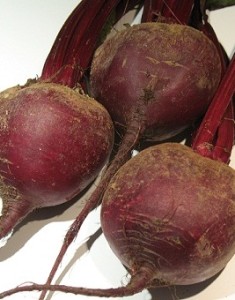Red beets are suspected of poisoning 40 school children on January 10, 2014, in Lambersart, France.
According to food service provider Sodexo, preliminary laboratory analysis indicates a bacteria on red beats that produces a toxin when stored at room temperature is  responsible for the outbreak.
responsible for the outbreak.
On January 10, 150 children in Lambersart began vomiting and having headaches. After being examined 40 children were diagnosed with “light” poisoning (something may be lost in translation here, but thanks, Amy, for the work, and Luca for the link).
Sodexo says it has changed their beat supplier and is strengthening their regular testing of suppliers.

.jpg) There’s lots of various E. coli out there
There’s lots of various E. coli out there